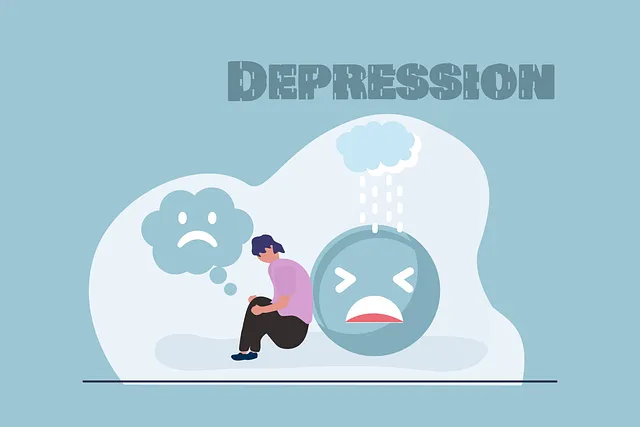Understanding mental health policies is key to advocating for better access to quality care, with organizations like Colorado Springs Kaiser Permanente leading the way through initiatives like public awareness campaigns and education programs. By analyzing these policies, advocates identify gaps and champion evidence-based solutions, ensuring stigma reduction remains a priority in healthcare reform discussions. The Colorado Springs Kaiser Permanente mental health facility stands out as a resource, offering comprehensive services that address diverse community needs, including reduced wait times and culturally sensitive options. Despite progress, disparities remain, calling for more inclusive approaches. Identifying gaps is crucial for policy advocacy, leading to proposed data-driven solutions like Emotional Well-being Promotion Techniques and innovative programs. Effective advocacy campaigns raise awareness and push for policies prioritizing comprehensive services, ultimately enhancing patient experiences and outcomes at facilities like Colorado Springs Kaiser Permanente.
Mental health policy analysis and advocacy are vital components of fostering community well-being. This comprehensive article explores these aspects through a strategic lens, focusing on Colorado Springs Kaiser Permanente as a prominent mental health facility. We delve into the understanding of mental health policy, its impact on communities, and identify gaps in current policies. By analyzing successful initiatives at Kaiser Permanente, we propose solutions and advocate for innovative strategies to drive positive change in mental healthcare.
- Understanding Mental Health Policy: A Foundation for Advocacy
- The Role of Colorado Springs Kaiser Permanente in Mental Healthcare
- Analysis of Current Policies and Their Impact on Community Well-being
- Identifying Gaps and Proposing Solutions: A Strategic Approach
- Advocacy Strategies to Drive Positive Change in Mental Health Care
Understanding Mental Health Policy: A Foundation for Advocacy

Understanding Mental health policy is a cornerstone for advocacy efforts aimed at improving access to quality care and support for individuals facing mental illness. The policies that shape mental healthcare systems, including those implemented by organizations like Colorado Springs Kaiser Permanente mental health facility, directly impact the availability, affordability, and acceptability of services. By examining these policies, advocates can identify gaps and barriers hindering optimal care.
For instance, public awareness campaigns development and Mental Health Education Programs Design can be instrumental in promoting understanding and reducing the stigma associated with mental illness. Colorado Springs Kaiser Permanente’s initiatives in this area could serve as a model for other institutions, demonstrating effective strategies to foster inclusive environments that encourage individuals to seek help without fear of judgment. Ultimately, these policy analyses empower advocates to champion evidence-based solutions, ensuring Mental Illness Stigma Reduction Efforts are at the forefront of healthcare reform discussions.
The Role of Colorado Springs Kaiser Permanente in Mental Healthcare

Colorado Springs Kaiser Permanente stands as a beacon for mental healthcare excellence within its community and beyond. As one of the leading health facilities in the region, it plays a pivotal role in addressing the growing need for accessible and comprehensive psychological services. The organization’s commitment to mental wellness is evident through its diverse range of programs and initiatives tailored to prevent and manage conditions such as depression and anxiety.
The mental health facility offers a comprehensive approach to patient care, incorporating evidence-based practices alongside innovative therapeutic techniques. By prioritizing Depression Prevention, Stress Reduction Methods, and Self-Esteem Improvement, Kaiser Permanente empowers individuals to take charge of their mental well-being. Through community outreach programs and specialized treatments, they foster an environment where residents can openly discuss their struggles and access the support needed for lasting recovery.
Analysis of Current Policies and Their Impact on Community Well-being

In Colorado Springs, the Kaiser Permanente mental health facility serves as a cornerstone of the community’s healthcare landscape. An analysis of current policies reveals both promising initiatives and areas for improvement in addressing mental well-being. Local policies have made strides in expanding access to mental health services, particularly through innovative partnerships with community organizations focused on diverse populations. However, disparities persist, especially among marginalized communities, highlighting the need for more inclusive approaches.
The impact of these policies on community well-being is evident in reduced wait times and increased availability of culturally sensitive mental healthcare options. Initiatives like mandatory Healthcare Provider Cultural Competency Training have fostered better understanding and care for patients from various backgrounds. Moreover, self-care practices encouraged by local programs are empowering individuals to take charge of their mental health. Such efforts collectively contribute to a more holistic and responsive mental healthcare system tailored to the unique needs of Colorado Springs residents.
Identifying Gaps and Proposing Solutions: A Strategic Approach

Identifying gaps in mental health services is a crucial first step toward policy advocacy and positive change. By examining the landscape of available resources, such as the offerings at the Colorado Springs Kaiser Permanente mental health facility, advocates can pinpoint areas needing enhancement. For instance, while the facility provides essential services, there might be unmet needs among specific demographics or a lack of accessible programs tailored to unique populations.
Proposed solutions should emerge from this analysis, incorporating strategies like Emotional Well-being Promotion Techniques and the development of innovative programs, such as Mental Wellness Podcast Series Production and Mental Wellness Coaching Programs. These approaches can address identified gaps, ensuring comprehensive mental health support that caters to diverse needs. Such a strategic approach not only advocates for better policies but also fosters a more inclusive and supportive environment for mental wellness in communities like Colorado Springs.
Advocacy Strategies to Drive Positive Change in Mental Health Care

Advocacy plays a pivotal role in driving positive change within mental health care systems, especially at facilities like the Colorado Springs Kaiser Permanente mental health facility. Effective advocacy strategies involve raising awareness about mental health issues and the importance of accessible, quality care. This includes educating the public and policymakers on the need for comprehensive services that cater to diverse needs, from Stress Reduction Methods to Trauma Support Services. By fostering open dialogue, advocates can help shape policies that prioritize Inner Strength Development and resilience among individuals facing mental health challenges.
Organized advocacy efforts can lead to policy amendments, increased funding for mental health initiatives, and improved access to care. At the Colorado Springs Kaiser Permanente facility, these strategies might translate into better resource allocation, expanded service offerings, and more tailored support for patients. Ultimately, robust advocacy ensures that mental health policies reflect the urgency of addressing these issues, ultimately improving the lives of those seeking care.
Mental health policy analysis and advocacy are vital components of fostering community well-being. The article has explored these aspects through examining the role of Colorado Springs Kaiser Permanente, analyzing current policies, and proposing strategic solutions. By understanding the foundational principles of mental health policy, we can drive positive change in healthcare systems like the Colorado Springs Kaiser Permanente mental health facility. Through advocacy strategies tailored to address identified gaps, it’s possible to enhance access, improve outcomes, and ultimately revolutionize mental healthcare for better community health and resilience.





